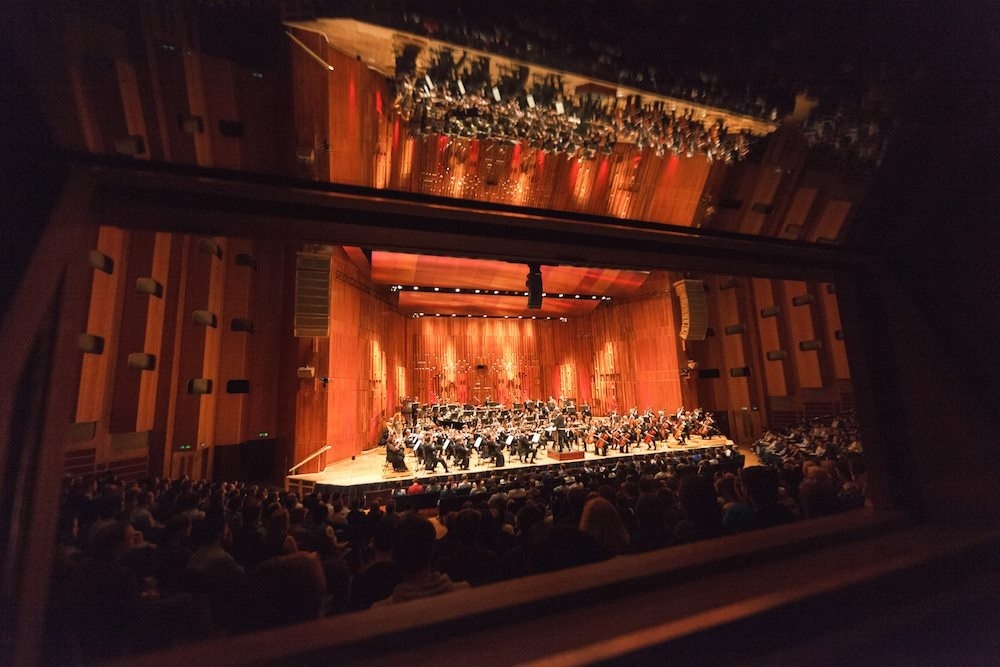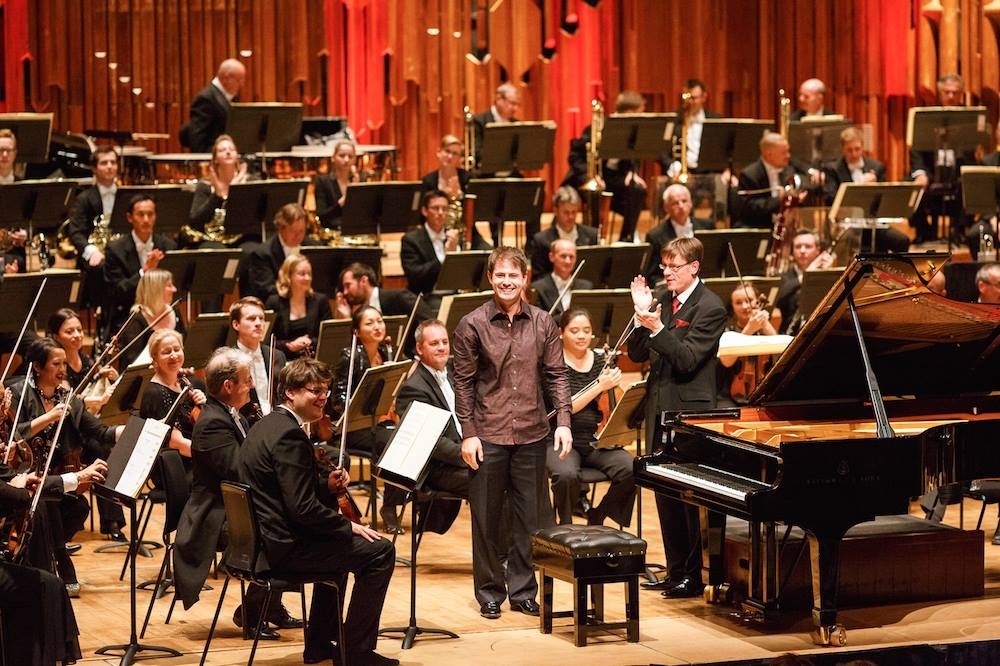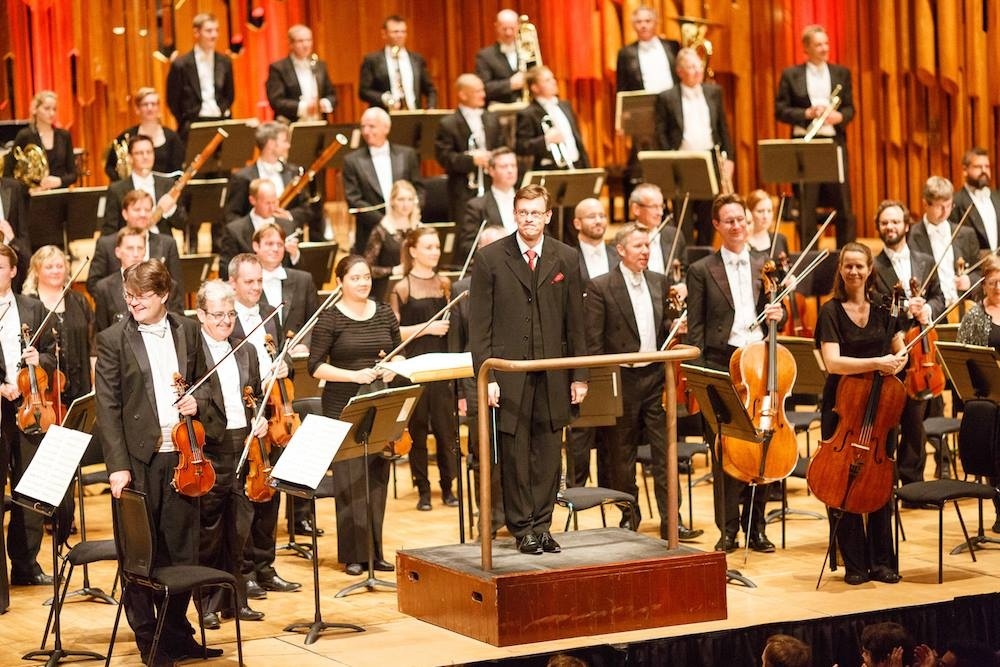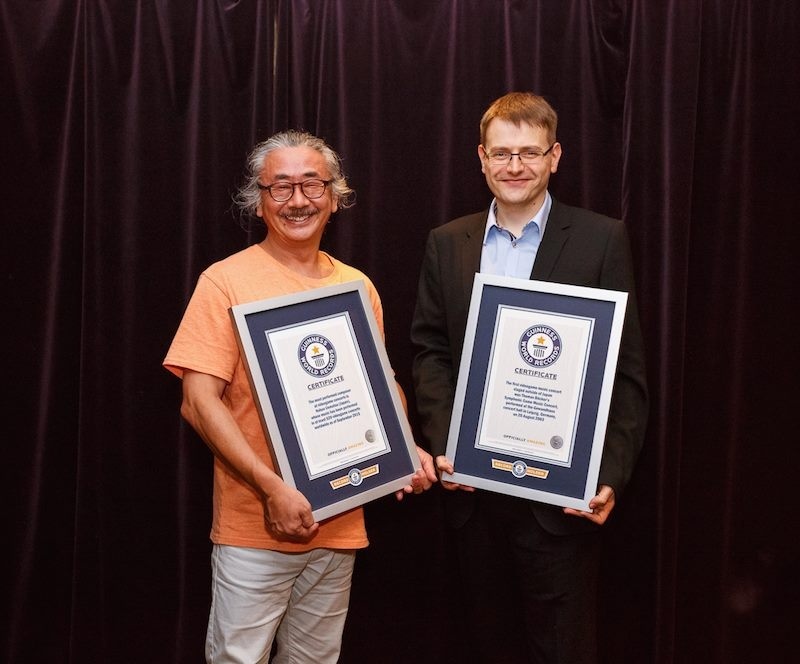It was fascinating to hear from the man himself, especially when the floor was opened to questions from the audience. Here, he confirmed that two of his favourite compositions are "Zanarkand" and "Dancing Mad;" that the Final Fantasy VI Piano Collections album almost didn't happen after the arranger/performer failed to produce any work for the session and was blighted by a bout of nerves; and that his and much of the other members of the panel's favourite Final Fantasy character is Kefka.

The talk was over an hour long, but ended all too soon and felt like it could have gone on for much, much longer - but, of course, the main focus of the evening was the music and the performance itself.
Like the first Final Symphony concert previously, the performance opened with an original composition by Jonne Valtonen, this time entitled "In a Roundabout Way - Fanfare." Similarly to "Circle within a Circle within a Circle," "In a Roundabout Way" was a fittingly energetic and dynamic piece to kick start the evening, while also flexing the metaphorical muscles of the orchestra in perpetration for the pieces ahead. The piece itself also sounded surprisingly well-suited to the overall tone and style of the Final Fantasy series, almost sounding like it could have been a bona fide piece composed for the games; perhaps as the accompaniment to an action-packed introductory FMV sequence or similar.

"For the People of Gaia," for example, seamlessly blended elements from multiple pieces, such as the usually jaunty and bouncy "Vivi's Theme," and more dramatic pieces, such as "Assault of the Silver Dragons" and "Kuja's Theme," to form one cohesive musical narrative - as a result, Wanamo's concerto for piano and orchestra elevated Uematsu's melodies into a piece that felt far greater than the sum of its parts. This was only helped, no doubt, by Slava Sidorenko's infectiously energetic and virtuosic performance on the piano; in particular the variations of "Vivi's Theme" being performed as a playful back and forth between the piano and sections of the orchestra, making for an especially compelling listen. "Festival of the Hunt" also featured quite heavily, Sidorenko here giving a fantastically adrenaline-pumping rendition of the theme and delivering a near-flawless performance in tandem with the orchestra. Excerpts from "Melodies of Life" and "Zidane's Theme" also made appearances, the former contributing much to the piece's emotional undertones, making for an impressively comprehensive review of Final Fantasy IX's core elements through only a handful of tracks alone.
"Utopia in the Sky" featured Valtonen's and Hamauzu's arrangement of the latter's own pieces from Final Fantasy XIII, including the now widely recognised motif from "Blinded By Light" and other familiar tracks, such as "Vanille's Theme," "Nautilus" and "Fang's Theme." Unlike the other arrangements, however, this one, in particular, felt more like a simple medley of individual tracks (albeit a highly sophisticated and impeccably performed one, as all the pieces were), rather than a complex interwoven narrative, as the others did. Regardless, Hamauzu's cinematic and sweeping score for FFXIII was well-suited to the symphonic style of the arrangement, the rousing and uplifting tone of "Prelude to FINAL FANTASY XIII" sounding especially lovely when performed by the entire orchestra. All in all, it was a satisfyingly complete showcase for a soundtrack that can, unfortunately, feel slightly dicey in some places, yet is still not without its highlights.

For example, a large majority of the original arrangement for "Liberi Fatali" was left untouched, and perhaps all the better for it - the original track is quite a powerful piece in itself, and even the absence of a vocal chorus did nothing to dampen the dramatic effect of the driving percussion and punchy brass interjections. The same can be said of "The Landing" and "The Oath," both of which were presented in ways that felt fresh enough to suit the arrangement, yet still heavily nostalgic and familiar enough to elicit emotions from those already familiar with the music.
Although it would be difficult to isolate just one particular highlight in such an accomplished piece, the "Waltz for the Moon" section in the middle definitely provided a great deal of enjoyment - the truly lush sound of the entire orchestra performing the waltz was a joy to behold; the subtle romantic undertones and joyously carefree performance provided a far more fulfilling experience than the synthesiser-heavy original featured in the OST. This arrangement was, without a doubt, Uematsu's music as it was always meant to be performed.

This, along other memorable moments, such as the tense "Psycho"-esque violin screeches introducing "The Evil Lord X-Death" and the series' "Victory Fanfare" being slipped in to coincide with a triumphant and sweeping rendition of "Main Theme of Final Fantasy V," made for the most pleasant surprise of the night thus far. The result was a musical tour de force, which FFV perhaps always should have been from the beginning, and a reminder that Uematsu's talents extend far beyond what many assume to be his best works.
The orchestra, Uematsu and the Final Symphony team received a standing ovation after it had finished - but the night was far from over. Much to the delight of everyone in the hall, two encores followed, the first of which initially coming as little surprise; after all, how can a Final Fantasy concert perform music from FFV and not include the legendary "Clash on the Big Bridge?" The key surprise came halfway through, though, where the orchestra abruptly stopped playing (so far it had been a fairly standard orchestral rendition of the theme) and the conductor and the tubist proceeded to exchange words in an odd little skit that eventually led to a cute rendition of the "Chocobo Theme" - which the rest of the orchestra picked up on and led to the biggest surprise of the night: a full-blown mashup of the two themes. It was part delight, part disbelief, hearing what was being played, as, on paper, the two would be near impossible to put together musically, but incredibly, amazingly, the end result was nothing short of a triumph. The sheer unexpectedness of such an arrangement was a surprise in itself, but the originality and inventiveness of the piece, in addition to the fact that against all odds, the melding of the two actually worked, was simply a wonderful moment. Although not even listed on the programme, "Clash de Chocobo" (unofficial title!) was by far the best surprise of the evening - a rare musical gift for fans who, up until now, had thought they had heard all there was to hear from the music of Final Fantasy and Uematsu's broad oeuvre.

There is no other way around it: Saturday's performance was quite simply one of the best performances of video game music to have ever been showcased. It would take at least several more close listens to the material to fully grasp the thought and complexity and consideration put into these pieces, which hopefully will soon be possible if the LSO and the producers return to Abbey Road to record another album - honestly, it would be nothing short of criminal to deny the world a chance to hear this incredible artistic feat. When it does inevitably happen, however, it should be more or less imperative for everyone, ranging from the most hardcore of Uematsu fans to those with only a passing interest in game music or classical music, to give these pieces at least one listen through. The combined forces of Uematsu's legendary tunes, Hamauzu's cinematic sensibilities and the unmatched talents of Wanamo, Valtonen and the flawless performance of the London Symphony Orchestra have resulted in what will no doubt go down in history as one of the landmark achievements in the field of video game music.

Quite frankly, a studio recording of the concert cannot come quickly enough.

 Sign In
Sign In 17.09.2015
17.09.2015  Game Details
Game Details
 Out now
Out now  Out now
Out now  Out now
Out now  Out now
Out now  Azuardo
Azuardo 
 Link to this post:
Link to this post:  Subscribe to this topic
Subscribe to this topic Features
Features





 Top
Top

